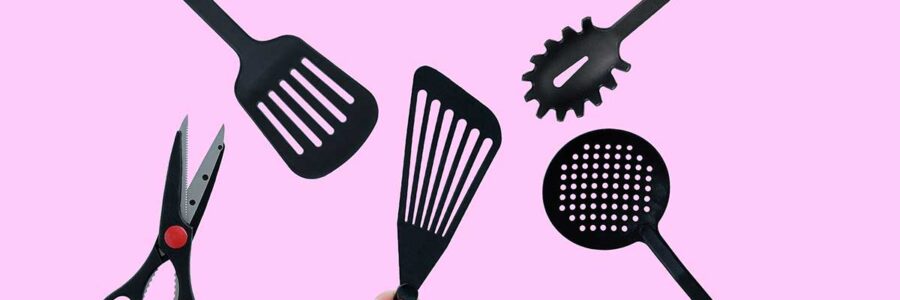As we become more aware of our products’ environmental and health impacts, one area in our homes often goes unnoticed when it comes to toxins: our kitchens. We focus on clean food, chemical-free cleaning products, and toxin-free cookware, but what about the utensils we use to prepare our meals? Specifically, black plastic cooking utensils such as spatulas, ladles, and tongs can be a hidden source of toxic chemicals.
Recently, a viral study gained widespread attention by suggesting that these black plastic kitchen tools were laced with carcinogenic flame retardants. While this study initially caused concern, the findings were later revised to reveal that the actual toxin levels were significantly lower than initially reported—about 10 times lower. This might lead some to believe the problem isn’t as severe as originally thought.[1]
What’s the Risk with Black Plastic Utensils?
However, despite the revised findings, the study’s conclusion remains important: black plastic cooking utensils contain harmful chemicals linked to cancer, hormone disruption, neurotoxicity, and reproductive issues. These chemicals, such as brominated flame retardants (BFRs), are incredibly resilient and bioaccumulated in the body, meaning they build up over time and can lead to a slow decline in health.[2]
This issue is particularly concerning because black plastic utensils are often made from recycled materials—specifically, recycled electronics that are melted down and repurposed into plastic. This process increases the likelihood that harmful substances from electronics, such as heavy metals and flame retardants, can enter your kitchen tools and, eventually, your food.
The Hidden Dangers of Recycled Electronics
The recycling of electronics to create black plastic utensils is a practice that exposes you to harmful chemicals and puts your food at risk. Electronics often contain dangerous substances, such as heavy metals and flame retardants, which can remain in the plastic when melted down and reformed. These substances are not meant for food contact, yet they end up in products like spatulas, ladles, and tongs used daily to prepare your meals. This practice poses a serious risk to your health, particularly when these toxins leach into the food you’re preparing.
The Solution: Switch to Non-Toxic Alternatives
So, what does this mean for you? Should you toss out your black plastic cooking utensils? The answer is yes. Even with the corrected toxin levels, these utensils still pose a significant risk to your health. The longer you use them, the greater the potential for harmful substances to leach into your food, contributing to a gradual build-up of toxins in your body. Fortunately, there are safer, non-toxic alternatives available. High-quality 18/0 and 13/0 stainless steel utensils are non-reactive, corrosion-resistant, and free from harmful chemicals. Wooden and bamboo utensils are also excellent choices, especially those made from 100% organic materials. These alternatives are safe and sustainable and don’t pose the same health risks as black plastic utensils.
Protect Your Health Today
Switching to these non-toxic alternatives in your kitchen is a simple yet powerful step toward protecting your health and reducing the risk of toxin accumulation over time. The takeaway is clear: black plastic cooking utensils remain a health hazard even with the corrected findings. These utensils contain toxins that accumulate in your body, potentially leading to serious health issues. Switching to non-toxic alternatives like stainless steel, wood, and bamboo is the best way to safeguard your health. By making this change, you can ensure your kitchen is a safer, healthier place to prepare meals.
References:
- Turner, Andrew. “Black Plastics: Linear and Circular Economies, Hazardous Additives and Marine Pollution.” Environment International, vol. 117, Aug.
- Kuang, Jiangmeng, et al. “Brominated Flame Retardants in Black Plastic Kitchen Utensils: Concentrations and Human Exposure Implications.” The Science of the Total Environment, vol. 610–611, Jan. 2018, pp. 1138–46.


